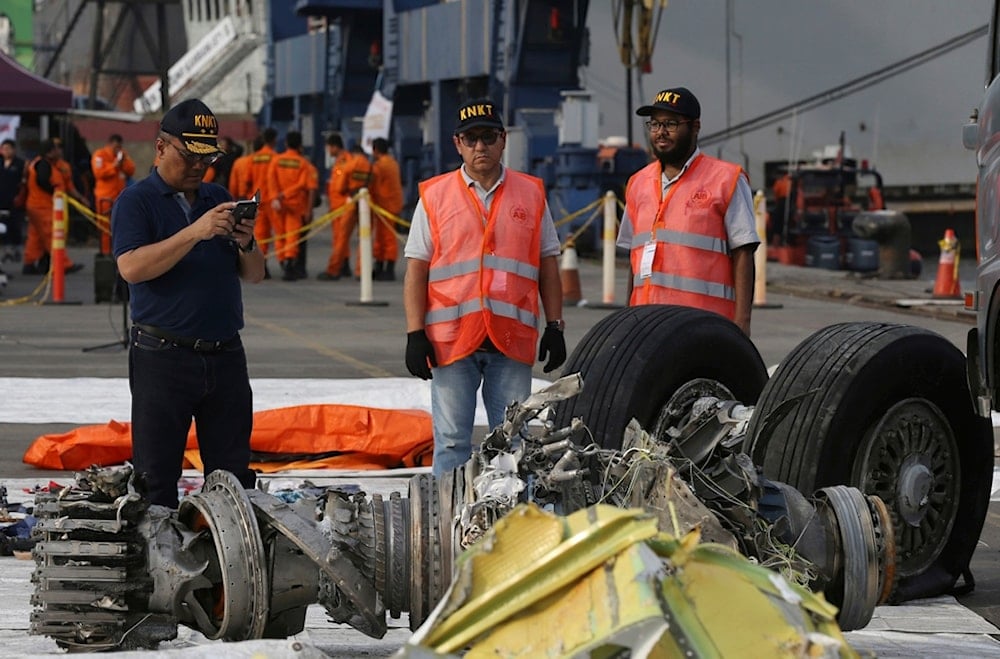Boeing reaches deal with DoJ to avoid prosecution over 737 Max crashes
Boeing reaches a $1.1B deal with the DOJ to avoid prosecution over the 737 Max crashes that killed 346, bypassing a criminal trial set for June.
-

Officials inspect an engine recovered from the crashed Lion Air jet in Jakarta, Indonesia, Nov. 4, 2018 (AP)
Boeing has reached a revised settlement with the US Department of Justice that will allow the aviation giant to avoid criminal prosecution in connection with the deadly 737 Max crashes in 2018 and 2019, which claimed the lives of 346 people. The new agreement, disclosed in a court filing on Friday, comes amid continued scrutiny of Boeing's safety practices and regulatory failures.
Under the terms of the new deal, Boeing will pay a total of $1.1 billion. This includes a $487.2 million criminal penalty, $444.5 million allocated to a compensation fund for families of crash victims, on top of the $500 million already paid in 2021, and $455 million to improve the company’s internal compliance, safety, and quality control programs.
In return, Boeing will avoid being labeled a convicted felon and will sidestep a criminal trial that had been scheduled for June, a long-running legal battle over the twin disasters involving Lion Air Flight 610 in Indonesia and Ethiopian Airlines Flight 302.
Previous plea deal rejected amid ethics concerns
The new deal follows a rejected plea agreement from July 2024, in which Boeing had agreed to plead guilty and pay $243.6 million in criminal penalties.
That proposal was thrown out in December by a federal judge who expressed concerns that the Justice Department's diversity, equity, and inclusion policies might influence the selection of an independent corporate monitor.
The original 2021 settlement reached during the first Trump administration included a $2.5 billion package: $243.6 million in criminal charges, $1.77 billion in airline customer compensation, and $500 million for victims’ families.
At the time, it was heavily criticized for allowing Boeing to avoid prosecution despite internal communications that revealed knowledge of serious safety issues before the crashes occurred.
Boeing’s safety woes continue to mount
The 737 Max program has become a symbol of Boeing's broader safety and compliance crisis. In January 2024, a door plug on an Alaska Airlines 737-9 Max blew out mid-flight, prompting the Federal Aviation Administration (FAA) to ground all planes of that model.
The incident further fueled accusations that Boeing had failed to meet the obligations set forth in the 2021 agreement.
Following the Alaska Airlines event, federal prosecutors alleged that Boeing had violated the terms of its original deal by not implementing a robust ethics and compliance framework to prevent fraud.
Families of Boeing 737 crash victims urge judge
The families of some of the 346 victims killed in two fatal Boeing 737 Max crashes demanded in August that the US judge handling the lawsuit reject the planemaker’s proposed plea deal with the US Department of Justice, proposing that the government sets a higher fine.
In July, Boeing and the US government finalized a plea deal involving the planemaker admitting to conspiracy to defraud the United States. As part of the plea deal, Boeing will pay a fine set between $243.6 million and $487 million and will be subject to oversight by an independent monitor for three years.
The two tragic crashes occurred in Indonesia in 2018 and Ethiopia in 2019, both linked to a flight-control system about which Boeing was accused of misleading regulators. In 2021, Boeing reached a $2.5 billion settlement that included the same $243.6 million fine and commitments to comply with specific conditions.

 4 Min Read
4 Min Read









